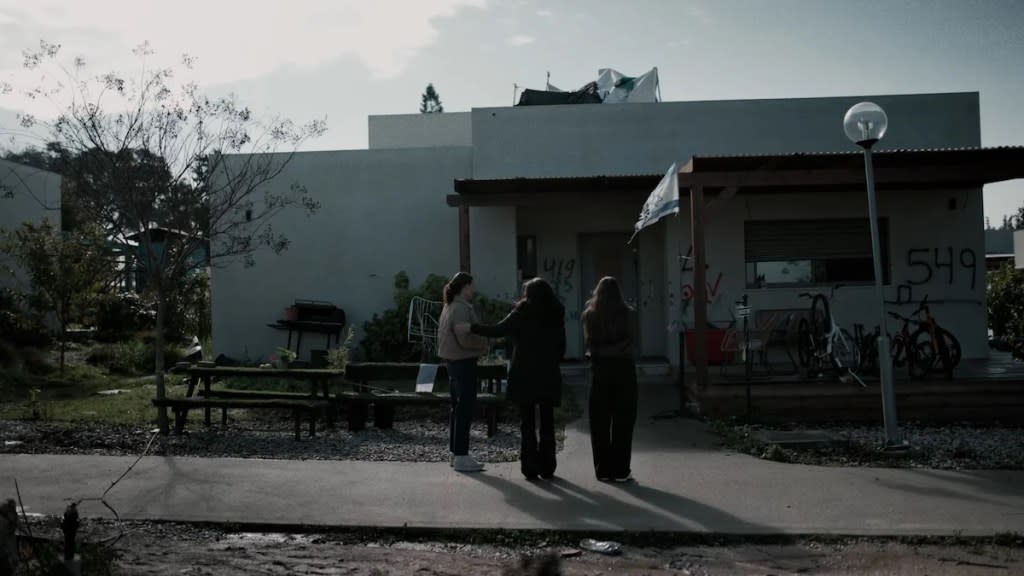In Sheryl Sandberg’s ‘Screams Before Silence’ Doc, Survivors of Oct. 7 Sexual Violence Speak: ‘Mom, They’re Going to Rape Me Now’

- Oops!Something went wrong.Please try again later.
“Screams Before Silence,” a documentary from Israeli production company Kastina Communications (“Fauda”), begins with a note that viewer discretion is advised. As trigger warnings go, this one is exceptionally understated. Though the film runs just 60 minutes, it’s often so challenging to watch that it seems to last twice as long.
To be clear, that’s not a criticism of the work itself — director Anat Stalinsky has done an immensely powerful job bringing us back to the Oct. 7 Hamas attacks on Israel, which ignited the region’s still-raging war.
Stalinsky’s particular and unapologetically narrow focus is on Hamas’ use of sexual violence as a tool of combat. She starts by taking us into burned-out homes, which are shot by cinematographer Sasha Gavrikov with an eerie, devastatingly stark beauty that resembles nothing so much as a horror film — which is, in its way, what this is. Note that any review of a movie as explicit as this one requires the strongest of trigger warnings, too.
Our guide through the wreckage is a visibly emotional Sheryl Sandberg, the former Meta COO and author of the feminist manifesto “Lean In.” Sandberg walks amid the demolished Kfar Aza kibbutz with two former residents, Chen Goldstein Almog and her teen daughter Agam, both of whom were kidnapped last Oct. 7 and held hostage for 51 days.
They are remarkably composed as they return to the scene, but we don’t realize the depths of this challenge until Agam stares at the floor while talking about her father. “And I didn’t say goodbye to him, or hug him, or kiss him,” she remembers quietly, as she recounts their last moments before he and her sister were shot and she and her mother were taken away. “I looked at her,” she adds, “and said, ‘Mom, they’re going to rape me now.'”
There are many similar memories from women throughout the film, and also from those traumatized by the violence around them. Sandberg visits the site of the Nova music festival with Tali Binner, who steps back into the tiny trailer where she hid for seven hours.
Binner takes a few deep breaths, and then shares what she heard while she was waiting: “There were so many noises of women. A girl started to yell for a long time, ‘Please stop, stop, stop.’ And it doesn’t stop,” Binner recalls, until it does — and then there is only silence. “I’m starting to calculate, what’s worse: to get kidnapped, to be raped, to get shot? What’s worse? What’s better?”
When Sandberg expresses surprise that Binner is able to discuss her experience at all, let alone so openly, she responds, “I decided to talk about it after I heard that people are trying to say it didn’t happen. I won’t forgive myself, if people are still saying those things [and] I know that it did.”
Her intentions are echoed by former hostage Amit Soussana. “If I can help the people who are still there,” Soussana says after describing her harrowing experience, “I want to.” (It has been estimated that there are around 130 Israeli hostages currently being held by Hamas.)
This sense of responsibility infuses the whole film, with one person after another revisiting nightmarish scenarios in order to create a record that cannot be ignored or forgotten. Stalinsky concentrates almost entirely on sexual assaults, but she approaches the subject with artistic restraint and in a range of straightforward ways — almost as if, as Binner says, she’s afraid it will be too easily dismissed. In addition to interviews along with photos and images captured by Gavrikov, we see copious footage taken by and of Hamas soldiers, which bluntly confirms the women’s stories.
Many of the accounts are so macabre, in fact, as to be unprintable. Occasionally, inevitably, the speakers’ controlled compartmentalization falters — as when Michal Ohana, who also attended the music festival, breaks down after a loud noise that sounds like a rocket interrupts her interview.
Shari Mendes, who was tasked with identifying disfigured bodies in the days after the attack, acknowledges the disorienting disparity between her words and her poise. “I must seem like I’m disciplined, and cool and calm,” she concedes. “I’m not. But if I start to be emotional, I may not be able to continue.”
Sandberg herself is unable to keep her composure when she sees photos of victims, which are too graphic to be shown onscreen. “This is the most important work of my life,” she says. “Maybe everything I’ve done has led to this moment.”
But the truth is, unlike so many people still in Israel and Gaza, she retains the privilege of security even while she is there. It’s the women she meets who have borne witness to the day she documents. All we can do, from the safety and comfort of our remove, is to hear them.
‘Screams Before Silence’ can be seen for free on YouTube or at ScreamsBeforeSilence.com.
The post In Sheryl Sandberg’s ‘Screams Before Silence’ Doc, Survivors of Oct. 7 Sexual Violence Speak: ‘Mom, They’re Going to Rape Me Now’ appeared first on TheWrap.

